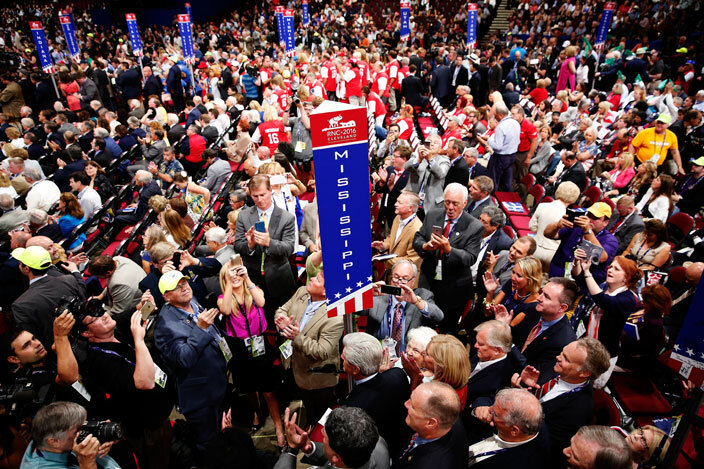The white convention: can Trump woo African Americans?
Jul 20, 2016
The party that gave the world the first black US secretary of state in Colin Powell and the first African American woman secretary of state in Condoleezza Rice has been accused of alienating black voters and one man in particular is getting the blame: Donald Trump.

For two nights in a row, the sea of humanity packed into the Republican National Convention has been overwhelmingly white with African American faces few and far between.
The party that gave the world the first black US secretary of state in Colin Powell and the first African American woman secretary of state in Condoleezza Rice has been accused of alienating black voters and one man in particular is getting the blame: Donald Trump.
"I can't speak for the whole community but I can speak for me and he has turned me off," says black retiree and Hillary Clinton supporter Gloria Bivins attending a civil rights convention in Ohio.
The billionaire Republican nominee has insulted immigrants, Muslims, women and the handicapped, and been accused of playing coy with white supremacists, doing nothing to win over the descendants of slavery.
While a recent Quinnipiac University poll found Clinton and Trump neck and neck nationwide, it said whites back the business tycoon 47-34 percent and black voters support Clinton 91-one percent.
The man whose job it is to change those numbers, Telly Lovelace, director of African American initiatives and urban media at the Republican National Committee, says it is too early to write him off.
"For him to win the Republican nomination he had to appeal to white voters," Lovelace told AFP. Now that primary season is over, Trump will change tack and start to talk about minority issues, he said.
But Lovelace admitted he is still working out his strategy for how best to convey Republican messages in black communities.
- At least consider it -
"Mr Trump has this bling factor which will attract a lot of African American and minorities to at least consider voting for him," he said.
Four years ago when the Republicans lost to Barack Obama for the second time, they commissioned a report that concluded that America had changed and to win power they must court minority voters.
Lovelace dismissed widespread criticism on the 2016 campaign trail that the party has not adequately reformed itself.
While Mitt Romney won six percent of the black vote in the 2012, he said, Republicans got 10 percent of the black vote in the 2014 mid-term elections and Ohio Governor John Kasich 26 percent.
Yet the optics, at least, do not look good for Trump. Unlike Clinton, he declined to address black civil rights organization the NAACP, in what has become a rite of passage for US presidential candidates.
Of 71 prime-time speakers scheduled to speak at the four-day convention in Cleveland, Politico said only seven are black.
The most prominent of them, former presidential candidate and retired neurosurgeon Ben Carson, made no mention of currently tense race relations, fueled by acts of violence and police shootings.
Outside the arena, Eric Smith, an African American business owner from Maryland told AFP that he took time off work to travel to Cleveland to prove that there is "a diverse amount of support for Trump."
Dressed in a campaign T-shirt, he said he was talking to political opponents in an attempt to prove that the nominee is not racist.
 Delegates from Mississippi take part in the roll call in support of presumptive Republican presidential candidate Donald Trump on the second day of the Republican National Convention on July 19, 2016 at the Quicken Loans Arena in Cleveland, Ohio. Win McNamee/Getty Images/AFP
Delegates from Mississippi take part in the roll call in support of presumptive Republican presidential candidate Donald Trump on the second day of the Republican National Convention on July 19, 2016 at the Quicken Loans Arena in Cleveland, Ohio. Win McNamee/Getty Images/AFP
- The other side -
"I've been hugging non-Trump supporters!" he said.
"A lot of people think what they hear on the news, which isn't true, it's not true," he said. "So what I do is give them the other side."
For his part Tony Williams, 54, a Republican party member and state legislature staffer from Michigan attending forums on the sidelines of the convention said he was "comfortable" with Trump.
A life-long Republican, he did not vote for Obama, the country's first black president, and supports Trump's tax reform policies, pro-life position on abortion and backing of conservative judges on the Supreme Court.
Nevertheless he confessed that Trump was his third choice, behind Wisconsin Governor Scott Walker and Florida Senator Marco Rubio. He also thinks Trump must do more to unify the party.
"Sometimes it's his tone that is somewhat abrasive," he said. "His speech Thursday night will go a long way toward solidifying the base."
In Cincinnati at the NAACP convention, retired lobbyist Terry Pruitt, said Trump had alienated all types of Americans -- not just blacks.
"I think there are certainly factions and groups of the Republican party who genuinely want to do what they can to reach a united country and eliminate some of the racial problems," he said.
"With the right leadership we can tone down some of the rhetoric, that's why I have a big struggle with Donald Trump at this point because how do you take back some of the statements that he's made?"
